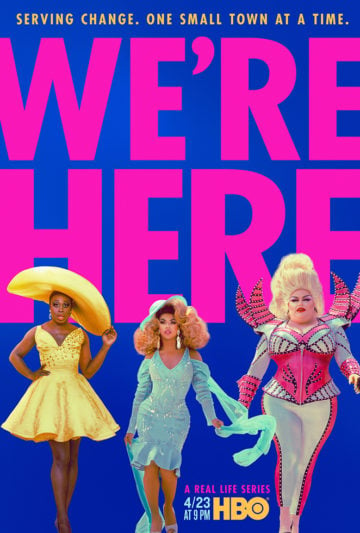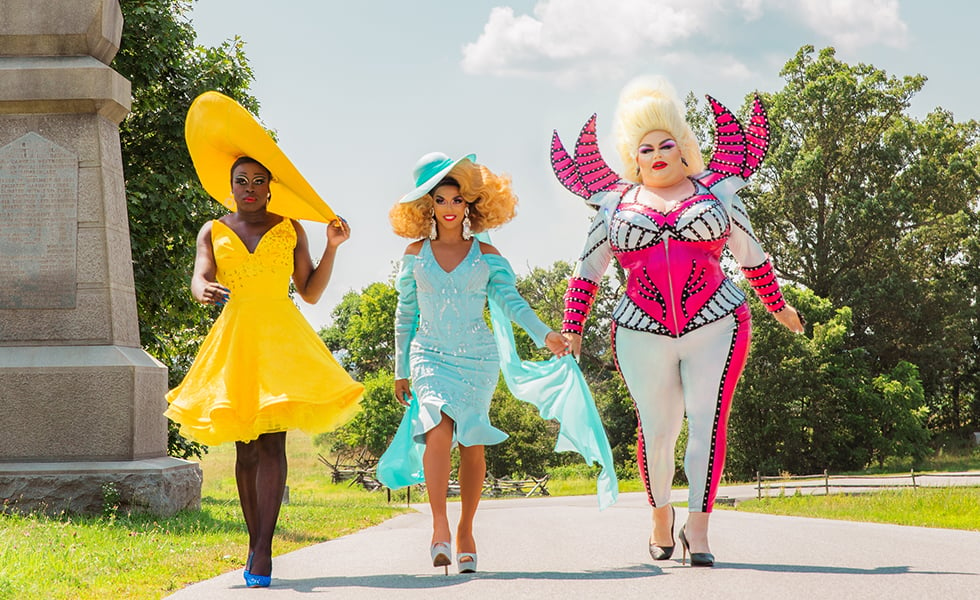Texas-born drag queen Shangela Laquifa Wadley, also known as DJ Pierce, makes a splash in HBO’s docuseries We’re Here. Along with Bob the Drag Queen and Eureka O’Hara, the fierce Shangela travels to small towns to recruit local residents for one-night-only drag shows. The result is a modern marvel of queer television with LGBTQ2 youth, estranged parents, and supportive allies all in stunning drag.
Shangela competed on three seasons of RuPaul’s Drag Race and has since proved herself as a force in the entertainment business, touring worldwide and guest starring on TV shows like Toddlers & Tiaras and Glee. In 2019, she became the first drag queen to walk the red carpet at the Academy Awards after appearing in A Star is Born.

When Shangela got on the phone with the Observer, she took a moment to wipe off cocoa foundation from the back of her hand after doing “a little glam” on her grandmother earlier that morning. “I’m an in-home one-stop-shop beauty shop now! Welcome to quarantine!” she said. We talked about what it was like growing up gay in Paris and how she’s moving things forward for the LGBTQ2 community in Texas and elsewhere.
Texas Observer: How are you doing? You’re quarantining here in Texas, right?
Shangela Laquifa Wadley: Yeah, I’m currently carrying out my social distancing near my family here in Paris, Texas. I’m with my grandmother and my mom in a home that I bought for my grandmother last August, but I’ve never been able to really spend time here because, you know, I’m a diva on the go. So if ever there was any bright spot to this craziness and nightmare called the pandemic, it’s really being able to spend two months consecutively near my family and all of us just reconnecting in a really beautiful way.
You’re someone who likes to keep busy and keep moving. Is it hard to have to stay put?
Well, I am truly a diva on the go. In 2018 I completed a 184-city tour around the world, so now being in one place for almost 90 days has been definitely a change in the way that I work. What I’ve learned is that I had to pivot—you know, if I was to use a dance term here, I had to pivot, honey! Grooved, moved, I did a cha cha slide and pivoted! And I’ve thankfully been able to work, but just in different ways. You know, I still think I’m just as busy as I was on the road. I’m just doing it all within the four walls of this home.
Do you have a favorite memory from the show?
I love working with my drag daughters, and honestly, my favorite memories come from being on stage with them after I’ve witnessed them go through their entire transformative journey over the week. That moment that they finish the show and they’re onstage and they’re so proud, and I’m also so proud. Sometimes you’ll even notice I get overcome with emotion, because I just know how hard they work for this moment. I think it’s like a parent at your kid’s graduation. You see them go through school for 18 years, and now they get to graduate and you’re just overcome with pride, and that’s really how I felt.
It seems like such an emotional experience for the audience, participants, and everyone involved. How did you deal with the emotional roller coaster of it?
You said the best word that you could say right there and that’s roller coaster. You get all the range of emotions, with the excitement of taking off, the nerves when you’re going up, the fear when you’re rolling around, and sometimes the tears when you go, “I’m gonna die!” And at the end, there’s this exhilaration that makes you go, “Oh my gosh, I want to do it again.” And that’s what this show was really for me. The best way that I could connect with people was to be open, honest, be authentic, and be ready to listen.

And I’ve lived this experience! You know, I’m originally from a small town. So I know a lot of times where these are hard conversations in a space that may be traditionally more conservative, or more Southern, where we just don’t talk about certain things. But I was ready to push the envelope on that. To show those families that I was open to listening to them. We say on the show that we’re not there to demonize any particular group that thinks differently than us. We’re there to showcase that we are here. And not just me Bob and Eureka, we’re here, but the LGBTQ community and experience is right here in your small town. So that’s enough of not talking about it, that’s enough of sweeping it under the rug. Let’s be visible. Let’s be out loud and proud, and let’s find some communities of support in a place that you didn’t think you had them.
How often were you thinking of home during filming?
Well, you can take the queen out of Paris, Texas, but you can’t take the Paris, Texas, out of the queen, OK? I thought about home so much! Like in Farmington, there was an LGBTQ Resource Center, which—wait, what? There’s a resource center for gays in this little bitty small town, that’s so amazing. That Identity Inc! existed there. And I was nostalgic about growing up in my small town, thinking ‘Wow, it would be so cool if we had a LGBTQ Resource Center.’ And we still don’t have one and maybe I should be a part of creating that. I’m always saying let’s go to our hometowns, so if we get a second season maybe that’ll happen.
You’ve talked about drag as a way to inspire infectious confidence. Tell me more about that idea.
I’m very thankful that the confidence drag queens a lot of times exude is something that people can attach to, and hopefully apply to their own daily lives. Honestly, it’s like a gas tank, right? You drive it, you use it, sometimes it gets empty, you got to refill it back up. That’s what I try to pass along to my drag daughters, is that, look, you worked so hard, you should be confident because you have worked to prepare for this moment. But always there are things in life that will come that will knock your confidence down, but what we’re doing with this show, hopefully, is equipping people with the tools and the knowledge that you do have the ability, you have the bandwidth, you have the ability, to be confident. So when it gets knocked down, you know that you have the ability to rebuild it for yourself, to fill it back up.
Do you have any advice for young queer Texans?
I will say hold true to who you are. Do not be ashamed of who you are. And no matter where you are, explore the best—be interested in becoming the best you possible. And I hope that also while doing that, we remember that so many people have walked a much more difficult road to get to where we are today. We have to remember them. We have to honor them by not giving up and not going backward. We have to be interested and committed to helping all of us as the LGBT community moves forward. We can do it in Texas because honey, everything’s bigger in Texas, which means bigger confidence, bigger ability, bigger talent, and bigger drive. Let’s do it. Halleloo!
Read more from the Observer:
-
Home Wasn’t Safe. Then COVID-19 Made It Seem Like the Only Option: Seeing a “disturbing” decrease in clients and callers amid COVID-19 stay-at-home orders, some domestic violence shelters in rural counties worry this is just the “calm before the storm.”
-
Norma McCorvey Took the Money of the Anti-Abortion Movement and Lost Herself. ‘AKA Jane Roe’ Is Her Attempt at Atonement: In a stunning deathbed confession, the woman who made Roe v. Wade possible tried to erase years of anti-abortion activism. But the damage has already been done.
-
Locked Out: Visitation is a critical lifeline for incarcerated people, yet some families say Texas prison officials ban them from seeing loved ones over petty or unproven claims of misconduct.







